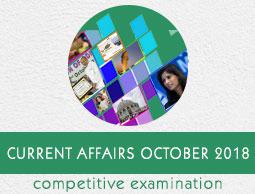Current Affairs Oct 2018 - International
1 - China's Multi-Role Combat Aircraft Made Debut Flight

The FTC-2000G, a new multirole combat aircraft developed for export by the State-owned Aviation Industry Corp of China, (AVIC) made its debut flight in the southwest Guizhou province.
The FTC-2000G is a fixed-wing, multi-role combat plane designed mainly with airstrikes against ground targets. It can be used as a fighter jet or trainer aircraft, AVIC. Further, the aircraft is equipped with modern radar and fire-control systems, which make it capable of staying airborne for three hours in a single operation. It can carry as much as 3 tonnes of missiles, rockets or bombs.
In the recent past, China developed a range of fighter jets including a stealth aircraft; with Pakistan. It also jointly produces JF-Thunder aircraft with Pakistan.
2 - WTO Sets Panel to Examine India-US Dispute

To examine the India-US export case, the World Trade Organisation’s (WTO) dispute settlement body has set up a panel. The US complaint is against certain export-subsidy measures by India and both the sides failed to resolve the issue at the consultation level.
The US pulled India to WTO over the export subsidies, saying that these incentives were actually harming the American firms. The US has requested to set up a dispute panel to examine the allegations on India’s export incentive measures. Besides, the U.S. has also challenged India’s export subsidy programmes such as Merchandise Exports from India Scheme in the WTO, emphasizing that these initiatives are harmful for its companies, and create an uneven playing field.
3 - India and the United Nations Sign Five-Year Sustainable Development Framework

Amitabh Kant - the CEO of NITI Aayog, and Yuri Afanasiev - United Nations Resident Coordinator in India, have signed the Government of India-United Nations Sustainable Development Framework (UNSDF) for the period 2018-2022.
Government of India-United Nations Sustainable Development Framework (SDF) 2018-2022 outlines the work of UN agencies in India. Its objective is to support the achievement of key development outcomes that have been identified in consultation with the government and are aligned to the national priorities.
The UNSDF 2018-22 consists of seven priority areas, which outline the work that UN agencies will undertake jointly or individually, fully aligned with the priorities of the Government of India.
Following are the seven priority areas outlined in the UNSDF:
- Poverty and Urbanization
- Health, Water, and Sanitation
- Education and Employability
- Nutrition and Food Security
- Climate Change, Clean Energy, and Disaster Resilience
- Skilling, Entrepreneurship, and Job Creation
- Gender Equality and Youth Development
4 - J P Nadda addresses Primary Health Care Conference In Kazakhstan

The conference, co-hosted by the Government of Kazakhstan, World Health Organization (WHO) and UNICEF (United Nations Children’s Fund) emphasised on Primary Health Care. The theme of the conference was “The Future of Primary Health Care.”
J P Nadda, the Union Minister for Health and Family Welfare, while addressing the 2nd International Conference on Primary Health Care (PHC) said, “Multi-sectoral action is a key to addressing social and environmental determinants and we have developed operational strategies to build a shared goal and vision between sectors such as nutrition, drinking water and sanitation, education, rural and urban development departments”.






